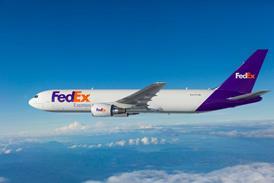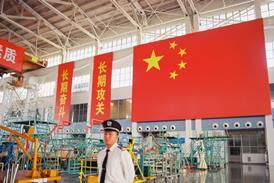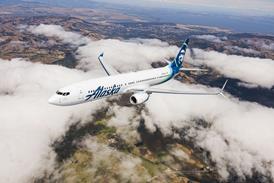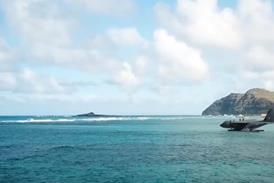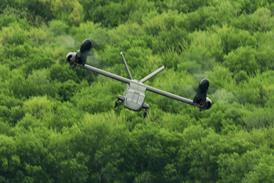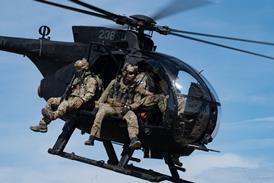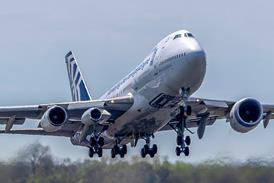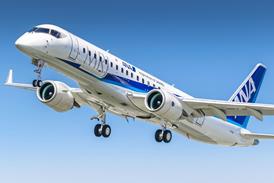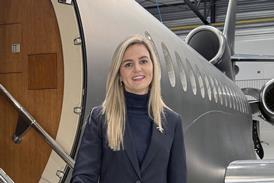Tony Tyler has had a distinguished career with Cathay Pacific Airways, culminating in him landing the top job in 2007. In this candid and wide-ranging interview Julian Gairdner caught up with him, discussing Tony's life and career
Where did you grow up as a child?
I was born in Egypt, but left before I can remember.We then lived in Haslemere, Surrey, apart from a very enjoyable spell in Malta from when I was eight to 13.
Can you tell us a bit about your family life?
My brother Tim and I had an older half-brother and three half-sisters all of whom had children of their own, so we grew up with nieces and nephews who were more like cousins to us.
My parents treated all six of us as if we were all "theirs" - there was no issue about being "his" or "hers".
My mother was from an Irish Catholic background and my father was a convert. We never missed church on Sunday, and generally had a very happy family life. I went through a very bolshy stage in my teens and must have been hard for my parents to live with. The age gap was quite extreme - my father was 51 when I was born and as a retired Major-General he found 1970's teenagers hard to understand I think. But I realised later how loving and supportive both my parents were in their way.
What are your fondest memories of your time at school?
Friends. We had a lot of fun just messing around with each other. I also enjoyed playing trombone in a jazz band, and acting, particularly in a couple of revues which I also wrote some sketches for. The rugby was great, too. I was a slow developer but made the first fifteen in my Oxbridge term having captained the thirds the year before. House matches were always fun - a chance to biff a few mates and some lads you weren't particularly fond of too!
Did you have any particular hobbies?
Rugby, music and drinking! I played rugby quite seriously until my late twenties, and I'm still a keen follower of the game and spectator. I gave up the trombone when I left school, but later on took up the guitar. I play and sing in a rock band in Hong Kong.
How did you come to work in the airline industry?
I intended to become a lawyer after Oxford, but realised that it wasn't what I wanted to do. Most of all I wanted to live and work away from the UK. It was a pretty dreadful place in the mid-seventies which was when I was making my career decisions.
So I applied for any job which would get me overseas, preferably a long way away. I joined the Swire Group which is a large conglomerate with operations all around the world but based mostly in Hong Kong and Asia. It consists of some family-owned private companies and some listed enterprises, one of which is Cathay Pacific Airways. Swires sent me to Australia first to work in a road-transport and cold storage business, then posted me to the airline, where I've been ever since.
Why did you choose to work in the Asia Pacific region rather than stay in the UK?
I was very lucky to go to Asia at a time when it was really starting to boom. I got there in 1977, and only two years later China started to "open up". The changes in South East Asia, Greater China, Japan and Korea in the last 30 years have been astonishing. It's been fun to be there all this time.
Having said that, the UK changed a lot too in the Eighties, and became a much better place. But I never really regretted leaving it.
What roles have you held during your climb to the top of the company and in which countries have you worked during your tenure at Cathay?
The Swire approach to management development is to learn by doing. They throw you in at the deep end and keep a friendly eye on you to make sure you are swimming not sinking.
After my first year in Australia and a couple of months of familiarisation and airline training in Hong Kong, I was sent to Manila. Within a couple of months I was Assistant Manager - Philippines. Then I spent three years in Hong Kong planning schedules and routes. One of the new routes I worked on was to Vancouver, and I was sent there to help set it all up and get it operating. After about eighteen months in Canada I moved to Japan to be based in Osaka as Manager West Japan.
The mid-eighties were busy times for Cathay Pacific with a lot of expansion going on. After not much more than a year I was moved again to be Manager Italy and France where I had to open offices and operations in both Rome and Paris. I had a happy couple of years in Rome, at least once I'd got used to how different Japan and Italy could be.
Then I had a big promotion to come back to Hong Kong as General Staff Manager - we call the position Personnel Director now. I reported to the Managing Director - who'd been to Downside, by the way. I was only 32 when I took the job on, and had responsibility for the HR function throughout the business. I did it for four years and was just about burned out by then so they sent me to be General Manager Europe for a bit of a rest back in the UK.
I did less than two years of that before coming back to Hong Kong as Director Service Delivery. In that job I was responsible for all our in-flight and ground service, plus security and lots of other things like properties and eventually the move to the new airport.
In 1996 I joined the Board as Director Corporate Development which covers a broad remit of commercial and strategic issues and is really the number 3 job in the Company. I stayed there for about eight years during which we had to weather the Asian financial crisis, a couple of major industrial disputes, SARS, the 9/11 air traffic crisis and other interesting times. I became Chief Operating Officer in 2005 and then was handed the top job in 2007.
Can you pick one good and one bad "incident" in your career that you would advise to follow/ advise against!
Most of the good decisions I've made just look obvious in hindsight, although often they didn't at the time. I've learned that you don't always have to have the last word in any argument, and that it's usually a good thing to give other people the credit when things go well.
My Australian colleagues - actually one in particular - taught me early on to show respect for others' work. I was being persistently flippant about what she did day-in, day-out, and she did the Pommie upstart a big favour in the long term by putting me firmly in my place!
What particular challenges have you faced during your first year as Chief Executive of Cathay?
I took over in mid-2007 which turned out to be our best year ever. Although fuel prices had started to climb the levels of demand for both passenger and cargo services was very strong indeed so we did very well. Things continued to go well into January last year although we started to worry a lot about the fuel price. Then until August oil went through the roof and although demand was still strong we started to lose money. There was no way we could keep up with the fuel costs. In September came Lehman Brothers and the acceleration of the economic meltdown we are now in.
So roughly speaking I've had six great months, then six months of huge cost problems, then six months and more to come of a serious collapse in revenues. Plenty of challenges ahead.
Have you had to change the organisation as a result of these challenges? If so, how has it changed?
The organisation itself hasn't had to change much, at least not yet. What has had to change has been the message. It's really important in our company that everyone understands the commercial environment we are working in. I've spent a lot of time communicating about that.
I also commissioned a complete strategic review when I took over. The results have confirmed much of what we've been doing for a while, but also identified some things we need to do better or do differently. We are going to push on with these despite our current difficulties because they are so important to winning in the long term.
Where do you see Cathay Pacific in five year's time?
Well, first let's assume there is going to be a recovery in the world economy some time in the next two years. I see us as achieving our goal of being the world's best airline. Success will be built on exceptional service which will drive strong and profitable relationships with our customers. We'll be flying to all major cities and hubs around the world, and will continue to cover the whole of Asia very comprehensively.
Our people will all be really proud of working for the airline, and Hong Kong will be proud of our success and reputation. We'll be seen as leaders in social and environmental responsibility, and it goes without saying that we will continue to put safety first in everything we do.
I won't be around to see all this happen because our retirement age is 57 and I'm about to turn 54. But much of it's already in place or will be soon.
Does the emergence of low cost carrier airlines pose a threat to Cathay Pacific within Asia?
Yes, but it's one we can manage. We've seen what can happen if you don't take the threat seriously. For various reasons the network carriers in Asia like ourselves can compete better with the no-frills airlines than the Europeans could when Ryanair and Easyjet got going. But the well managed new airlines in Asia will survive. So will the ones owned by governments of course. Government ownership is one of the curses of our industry.
How did the British handover of Hong Kong in 1997 impact on Cathay Pacific in Hong Kong and your everyday life in Hong Kong?
Well, the change meant a lot of preparatory work to protect our traffic rights, which are the lifeblood of any airline. It meant renegotiating all Hong Kong's Air Service Agreements with every country we flew to; having said that, the changes have only been positive for us as a business. It took us a while but eventually we've been able to get a comprehensive network in mainland China which we could never have had as a colonial carrier.
Everyday life in Hong Kong has not noticeably changed. It's nice not having to answer the question what's going to happen after the handover. More seriously, Hong Kong people have become more self-confident, I think. It's made them nicer to be with and the place a better place to live and work.
Has the work ethic within Cathay Pacific changed as a result of the influence of the Chinese regime?
No, because the direct influence of mainland China on how we do things has been negligible - The Central People's Government has generally adopted a hands-off approach to Hong Kong and has been very supportive when Hong Kong has needed an economic boost from time to time. It's now more than 10 years since the British left and Hong Kong has of course changed in that time. Cathay Pacific has too. But the changes are mostly to do with things like the Asian financial crisis and SARS, and the impact of the internet and globalisation. And in our specific case the new Hong Kong airport.
If you were to offer advice to anyone just starting out and looking for a job during these difficult economic times, what would it be?
Good luck - rather you than me. This has to be about the most difficult time to look for a job that anyone can remember. But it's not a hopeless situation. Work hard to get yourself qualified in a way your preferred employer or profession will value, and be persistent and patient. Remember the world doesn't owe you a living. Think about and look for opportunities outside the UK - Asia in particular. The whole world is struggling at the moment but Asia will bounce back first and highest. You are going to have to work for it, but while there's a lot of competition out there, there's also going to be a lot of opportunity once our current economic problems are over. And they will be before too long, I'm sure of that.
Source: Airline Business

